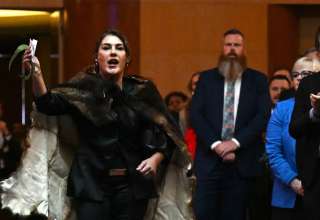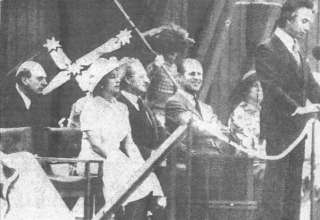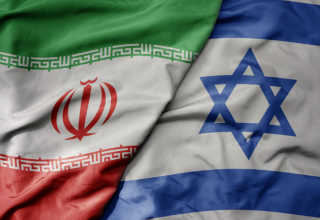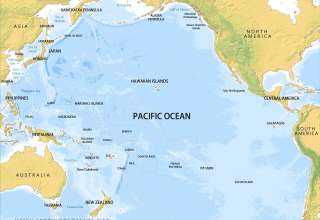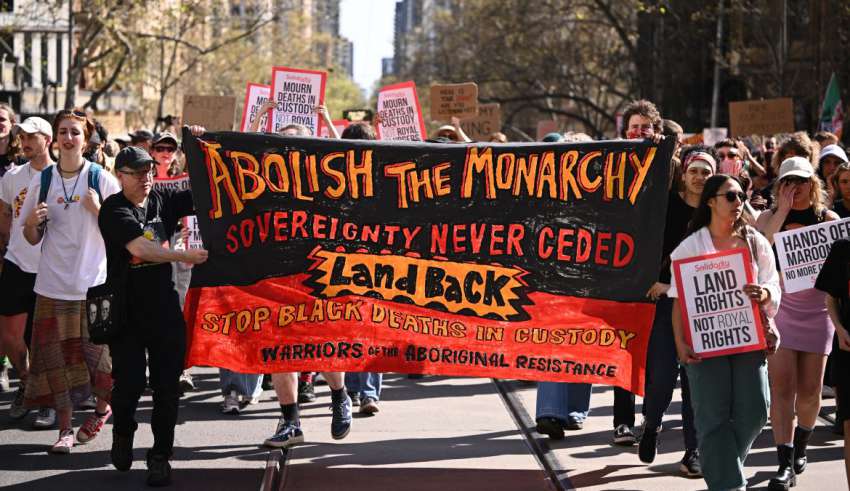
by Humphrey McQueen (2000)
This is the second of a two-part series
The Australian Republican Movement recently wrote to King Charles III what only can be described as a begging letter inviting him to: ”Join Australia In Celebration Of A Republic And Australia’s Moves Towards Full Independence.” It is hardly likely that this class enemy will entertain the requests the ARM makes of him for First Nations suffering at the hands of British Imperialism or willingly promote the cause of an Australian republic and independence. Spirit of Eureka republishes Humphrey McQueen’s article from 25 years ago, “A socialist’s republic”, with an addendum explaining how the Queen gave Charles access to the Crown Jewels and tax-free estates, as a counter to ARM’s flawed approach to a republic.
See ARM’s letter to King Charles
B. social equality
Through generations of struggle, Australia’s working people here have marginalized the feudal trappings of Britain. That achievement has not vanquished the capitalist division between those who control productive property and those who have nothing to sell but their labour power. So, settler Australia has always been a class society. The absence of the accoutrements of Europe’s aristocracy accounts for the popularity of the claim that we are a classless society.
The latest Royal sojourn revived the claim that the Queen is above politics. That comment is true in only the most restricted sense of her not being openly pro- or anti- either of the major party machines. Her minders are smart enough to know that the difference between them, both here and in the United Kingdom, is so infinitesimal as not to affect her interests. The game of parliamentary ins and outs is the least important element in the distribution of power. In vital areas, the monarchical principle is ideologically pro-capitalist. This bias has nothing to do with the Queen’s rating as one of the richest people in the world. The royal fortune epitomizes the unearned income of how the capitalist as rentier, and of all capitalists live off the labour of others. As a symbol of how a minority should flourish without working, hereditary rule validates that class system. Academic apologists for capitalism have never been able to explain why the children of capitalists should inherit wealth that they have done nothing to earn.
The Windsors have learnt not to flaunt their wealth. Throughout the 1950s, the Queen appeared on our postage stamps dripping with diamonds. Since the 1970s, she has been turned up in coloured street frocks, indistinguishable from any well-heeled matron. Glamour is the most that the royals now dare parade. That discretion reduces any purchase that they have on majesty. Majesty was never a personal attribute but always the product of pomp and circumstance, a masquerade now reduced to the pomposities of Australians for Constitutional Monarchy.
Snobbery remains a potent weapon in the monarchists’ armory. Curtseying bestows on the servile a sense of superiority over those of us who, as Henry Lawson said, ‘call no biped lord or ‘sir’, And touch their hats to no man!’ Although talk of blue blood has disappeared, the myth that the royals are innately superior lingers and lends support to the notion that some people are born to rule over the rest of us. Elizabeth Windsor is the Queen of Australia because of her birth, not any achievement. Thus, we have a model of public life which proclaims inheritance to be more meritorious than effort. The prime argument for dumping the current constitutional arrangement is to be rid of such anti-democratic assumptions. A monarchical system requires a subordinate people as much as it elevates the privileged few. Because Australians have created ways of life remote from the excesses of pre-capitalist social order, we can lose sight of the inequalitarian structures on which every monarchy rests, whether the modest Scandinavian versions or the Tongan autocracy.
The point at issue is highlighted by the Japanese imperial household, even after its surrender of pretensions to the divine and General MacArthur’s relegation of the emperor to being the symbol of the state, not even its nominal head. The Japanese people refer to their current emperor as a salary-man, that is, as a totally undistinguished character. Yet his office remains the pinnacle of the Shinto cult of cleanliness. This absolute purity requires the positing of its opposite in total filth, a burden allotted to the two or three million untouchables (Burakuin) descendants of those who did the dirty work of tanning and handling the dead. Corporations maintain registers of Burakuin names to block their employment. The liberation of those at the bottom of the social heap can never be complete for as long as Japan’s public culture retains their antithesis as its symbolic head. Australia has never had a social order as discriminatory as the Japanese. Nonetheless, that presumption about superiors-inferiors infects every hereditary arrangement.
Only 5 percent of Australians believe that a monarchical system is good in itself. Supporters of the divine right of kings are even fewer than the number of royals sponging on the public purse. The Constitutional Monarchists abandoned all pretence that monarchy in preferable on principle. Instead, they aimed their attack on the republican model on offer, an easy target because it was so remote from republican values.
The Constitutional Monarchists were also too canny to argue that hereditary bestowed any grace on the individual royals, which would have been difficult to maintain in light their behaviour towards each other. What the House of Saxe-Coburg-Gotha (also known as Windsor) has inherited are dysfunctional children from a succession of thuggish fathers across 200 years. The Constitutional Monarchists reply that their system is not responsible for individual indiscretions, or even for collective misdemeanours and cruelties. Yet, if the Windsors do not possess the qualities to make even themselves happy and glorious, by what right do they reign over the rest of us? The case for any monarchy must be the inheritance of intrinsic worth, or it is a nothing.
In the middle of the referendum campaign in October 1999, the chair of Australian for Constitutional Monarchy Professor Flint, so forgot the proprieties of his public office as head of the Australian Broadcasting Authority (ABA) that he allowed himself to be interviewed about the republic by John Laws, then subject to an ABA investigation. This instance exposed how monarchists conceive themselves to be superior to the rules that apply to the mob. Flint’s breech of decorum was nothing compared with the affront delivered to republican virtue by the stream of minimalists who accepted the largesse of Rupert Murdoch to relaunch John Laws’s reputation for Foxtel in March 2000. The Whitlams, Bob Carr, and Democrat Senator Stott Despoja attended, while the Victorian and Queensland ALP premiers sent video testimonials. Guest of honour Germaine Greer’s excuse that she had blown in only for the money highlights that the battle in front of republicans and socialists alike is against plutocracy.
From Brad Buckley and John Conomos (eds), Republics of Ideas, Republicanism Culture Visual Arts, Sydney, Pluto Press, 2001, pp. 160-8.
Addendum, September 2022
Down with all parasites!
The death of Elizabeth Windsor will not give rise to the glee that followed the demise of Margaret Thatcher.
While we are deep mourning for the coming fortnight of vacuous obsequies from non-entities who ‘did but see her passing by,’ we should reflect on the different roles that Windsor and Thatcher played in promoting the rule of monopolising capitals.
In brief, Thatcher was one of their representatives in the state apparatuses.
Windsor was both their representative but also their personification.
She was one of the wealthiest people in the world. As with all fortunes, hers came from the surplus-value extracted from us working people. Some of that exploitation was directly from the wage-slaves on her landed estates or out of the corporations in which she held shares. Some came indirectly out of the taxes from those properties. Like all capitalists, she was a parasite. And she has left a tribe of parasites.
That is what it means to be a personification of capital.
How Windsor represented the interests of the parasite classes around the world is more significant. The hereditary principle in the monarchies is based on the ‘born-to-rule’ view of humankind. Although monarchies are a dying breed, the capitalist system defends its parasites by all kinds of theological and pseudo-scientific claims that owners have a god-given right to control productive properties because they are innately superior to us wage-slaves.
Hence, our fight is for a socialist republic.
Windsor’s personal fortune was valued at only $500 million, but the Crown Estate owns assets and real estate valued at $34.3 billion. The Crown Estate earned a profit of $311 million in its most recent fiscal year, which means about $47 million was provided to the royal leeches. The U.K.’s monarch is exempt by law from one major tax aimed at the wealthy upon inheritance: the estate tax. King Charles III won’t face the U.K.’s 40% inheritance tax, which otherwise would have eaten up about $200 million of his mother’s estate.


